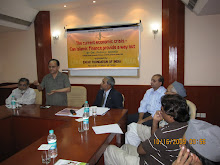First published in the Dallas Morning News. Jul 5, 2007
A recent poll by the Pew Research Center concluded that American Muslims are “decidedly American in their outlook, values, and attitudes.” Despite such mainstream attitudes, American Muslims remain the subject of profound misunderstandings and deep mistrust. An August 2006 Gallup poll found four in ten Americans admit feeling prejudice toward Muslims. Nearly one in four expressed unwillingness to live next to Muslim neighbors.
This irrational fear, or Islamophobia, leads to discrimination against Muslims, exclusion of Muslims from the sociopolitical process, guilt by association, and even hate crimes. In 2006, American Muslims reported over 2,000 incidents of alleged discrimination and more than 150 hate crime incidents to the Council on American-Islamic Relations. Since the 9/11 terror attacks, acts of discrimination and hate crimes have annually averaged double-digit growth rates.
In recent years, Islamophobia has gained currency in part due to a thesis advanced by Samuel Huntington (and eagerly embraced by neo-conservatives) that presents the inevitability of a “clash of civilizations” between Islam and the West. This thesis makes simple and fatalistic assumptions that the West and Islam are monolithic and culturally exclusive.
In his book “Lost History,” Michael Morgan makes a powerful case that – far from being culturally exclusive – Islamic civilization “seeded the European Renaissance and enabled many aspects of the modern West and global civilization. It is a history that by the beginning of the 21st century had been forgotten, ignored, misunderstood, suppressed, or even rewritten.”
This rewritten history has allowed those already predisposed to suspicion of Islam to create a climate of extreme prejudice, distrust and fear of Muslims. They fail to recognize that Islam is not monolithic. Muslims throughout their over fourteen hundred year history have often successfully adapted to new realities, or else they and their faith could not have flourished in so many regions of the world spanning so many varied cultures. Islam shares common values with other major faiths, favors peacemaking over violence, and unequivocally rejects killing innocent people, even in warfare.
Profound misunderstandings about Islam allow dismissal of any criticism by Muslims of American policy as reactionary and irrational. In the absence of American Muslim voices in policy making circles Islamophobia is becoming institutionalized, leading to tacit acceptance of discrimination against and profiling of Muslims.
In addition, American Muslims worry about the broader social impact of Islamophobia. Muslim youth grow up learning that plurality, equality and freedom constitute core American values. However, when they see that such ideas do not apply to their own empowerment, they are likely to become disillusioned and alienated.
A recent study sponsored by the Chicago Council on Global Affairs argues that a well-integrated and empowered Muslim population would better serve the United States as it navigates critical policy challenges involving Muslims both here and abroad.
The report ends with practical solutions calling for expanded partnerships between American Muslims and law enforcement, development of American Muslim leadership network to work with youth, building stronger American Muslim institutions and working with coalitions on common concerns like immigration and health care.
Testifying before the House Committee on Foreign Affairs, Steven Kull, editor of WorldPublicOpinion.org said, “Muslims share the worldwide view that the US does not live up to its own ideals of international law and democracy….There now seems to be a perception that the US has entered into a war against Islam itself. … 8 in 10 believe that the US seeks to weaken and divide the Islamic world.”
As a nation, we can ill afford the perception that we are at war with a faith practiced by more than a billion people accounting for over a fifth of humanity today.
Martin Luther King, Jr. once said, "And there comes a time when one must take a position that is neither safe, nor politic, nor popular, but one must take it because one's conscience tells one that it is right."
I take guidance from a Quranic verse: “O mankind! We created you from a single (pair) of a male and a female and made you into nations and tribes so that you may know (not despise) each other.” Promoting mutual understanding, not remaining entrenched in divisive worldviews, ought to guide our conscience. Ignoring it only perils the progression of our American civilization.
Blog Archive
-
►
2014
(1)
- ► April 2014 (1)
-
►
2010
(13)
- ► December 2010 (2)
- ► April 2010 (11)
-
►
2009
(6)
- ► October 2009 (2)
- ► April 2009 (2)
-
►
2008
(9)
- ► September 2008 (3)
- ► April 2008 (1)
-
▼
2007
(7)
- ► April 2007 (1)
- ► March 2007 (1)
-
►
2006
(1)
- ► October 2006 (1)

















No comments:
Post a Comment